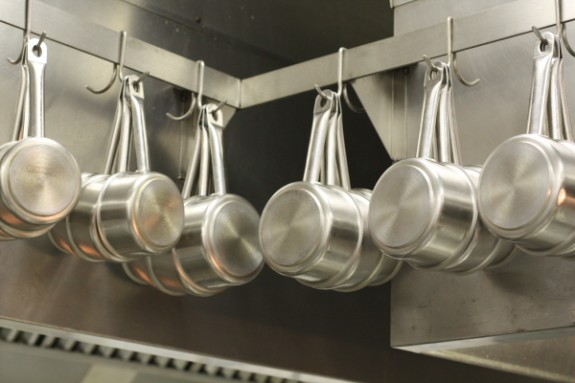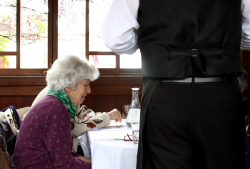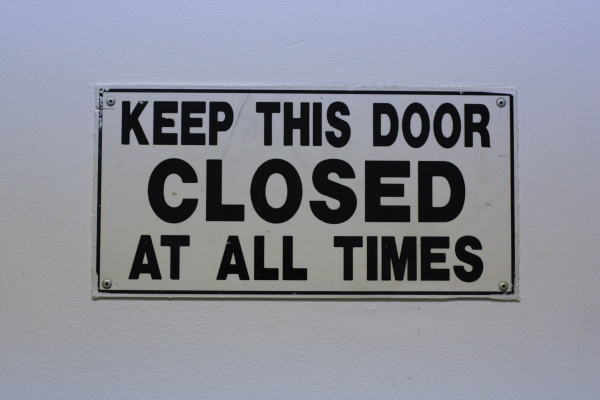Yesterday in the New York Time’s “Diner’s Journal,” New York Times’ “Your Money” columnist Ron Lieber wrote a brief dispatch about getting kicked out of Restaurant Marc Forgione in Tribeca in his post entitled “Why I got Kicked Out of a Restaurant on Saturday Night.” It’s a simple tale of customer vs. chef, clashing cultures, big egos, and differing points of view.
The abridged version of the story begins with journalist Lieber as diner. The writer was eating at Forgione’s restaurant this weekend when—during the height of service—Chef Forgione began berating one of his employees for talking back to him in, what I must assume to be, an open kitchen. The verbal attacks were so loud—Leiber wrote in his “Diner’s Journal” post—that many in the dining room were visually disturbed.
So enraged by the outburst’s effect on his appetite, Lieber marched into Forgione’s kitchen and scolded the chef for his behavior. When Lieber returned to his table to continue his meal, Chef Forgione followed him into the dining room to speak with the writer about the inappropriateness of his actions. No customer, Forgione said, has the right to reprimand the chef in his kitchen. Even if he was screaming bloody murder.
After a brief back and forth about unsuitable behaviors, Forgione demanded that Lieber (and his guests) leave immediately. Lieber did, in fact, exit the restaurant but departed with a burning desire to tell his story.
Though this type of incident is just the kind of thing that sparks millions of users to create a Yelp account, Lieber took full advantage of his access to one of the most powerful food sections in the country to tell his version of the story. Because let’s face it, most people would rather take the time to vent about bad service than go on-and-on about a great moment in their dining history.
But I digress.
Leiber’s account of the event yesterday—though compelling—made me suspect of the man writing the story. Who was this guy thinking he could storm into the kitchen and teach-that-son-of-a-bitch lesson? What exactly does a finance reporter know about the inner workings of a professional kitchen? Granted, screaming at an employee in the middle of service isn’t the best way to manage one’s staff, but that doesn’t mean a guest has the right to tell off a chef while he’s working what sort of behaviors he will or will not tolerate.
I’ve worked in restaurants for over 15 years, and I have never seen a guest enter the kitchen to berate the chef–and live to tell about it.
“Either you’ve worked in the restaurant business and get this, or you don’t,” wrote Susannah Breslin, a former waitress and journalist for True/Slant.com . “No one but the most self-entitled jerk of a customer walks into the kitchen.”

Though I am loathe to come out and say pointedly negative things about customers on this blog, I would have to agree with Breslin’s point. A customer who enters the sacred heart of a restaurant without invitation–and with the goal to demand certain actions from the chef–is, as the kids say it, cruisin’ for a bruising.
Restaurant guests, regardless of how opinionated they are, aren’t in charge of the restaurant. They are financial contributors. Yes, money talks. But money does not choose the décor, decide on ingredients, pick out the play-list, or hire the employees. Restaurant owners, chefs, and managers do that. Customers make their opinions known via sales (and customer feedback cards, and phone calls…).
So what have we learned? Well the first thing is, don’t even think that this recent incident gives the dining public the license to barge into their favorite kitchen and give the chef a piece of their mind. Be warned, the men and women working in kitchens are humans on the edge—they’re hungry, tired, and quick to fight—and are armed with sharp knives, fire, and all sorts of torture—I mean cooking—utensils.
Woe to the next Lieber-type that dares step into the kitchen. Chefs around the country are on notice that you may be coming and, most likely, won’t let you get away with just a verbal warning. Stay away from the kitchen. Customers are welcome to offer their positive and negative feedback in a more safe environment–via email and intermediaries like managers.

- Service 101: Where NOT to Eat on Mother’s Day
- Service 101: Why Servers Don’t Get Any Respect
- Service 101: Restaurants Are Not Picnic Tables
- Service 101: Waiting Tables is An Honorable Profession
- Service 101: Why You Shouldn’t Eat Out on Valentine’s Day
- Service 101: Why Diners Need Restaurant Critics
- Service 101: Just Because You’ve Traveled Doesn’t Mean You Are a Restaurant Expert


“What exactly does a finance reporter know about the inner workings of a professional kitchen?”
Huh? What does a finance reporter HAVE to know about that, since that wasn’t the topic? The topic was disturbance in the dining room that emanated from the kitchen.
After 15 years in restos, you know by now that the money-generating dining room trumps the special world of the kitchen. It’s about the revenue, not about sacred hearts. And the best chefs understand that — and so do the best leaders. One “praises publicly and criticizes privately,” something this stressed chef didn’t do.
Bringing the berate debate to the dining room was this chef’s second mistake.
Brooke — I’m totally with you that a diner’s got no business going into a restaurant kitchen uninvited. I’m also totally with you that a diner should have nothing to say about how a chef is managing his staff. However, it’s worth noting that a chef’s got no business bringing his staff disputes into the dining room, either. By having an audible (and uncomfortable) confrontation with an employee within earshot of his customers, it was the chef who first violated the chef/diner boundary. Even so, I think Leiber should stay out of the kitchen (and your point about the sharp knives would have been the deciding factor for me), but he could reasonably claim that it was the chef who came into the dining room.
I’m in complete agreement with you on your point–public outbursts like his just aren’t okay. I don’t condone screaming or think it’s conducive to the work environment AT ALL. Storming into the kitchen doesn’t work.
I’m with the Food Woolf on this one. Having worked in restaurants for many, many years, I’ve been subjected to the abuse of more than a few…colorful personalities. That said, unless you have a death wish, or at least a maim wish, stay out of the kitchen. If offended by the chef’s behavior, make your displeasure known to whoever’s managing the place, cancel your meal (though this is extremely inconvenient), take your business elsewhere if you see fit. But for the love of life, limb, and all that is holy, stay away from the kitchen.
I really hate to hear stories of bosses tearing in to staff members. I have personally worked at a company (not food related) where this kind of action happened every day, and it is not a situation that anyone should ever have to deal with.
To make it worse, that poor person then has to go out, put on a brave face, and serve customers who they know heard the chef who obviously has no self control humiliating him in front of the staff and restaurant goers.
I understand your point that patron’s shouldn’t go back in to the kitchen. It is dangerous back there, and just from a liability point of view, rather silly. The best thing honestly would have been to request to talk to the chef, and chat with him by the bar.
I hope this doesn’t get your back up, because it is certainly isn’t meant to – but in my mind certain chef’s out there need to realize that this is a customer service business. They also need to realize that the atmosphere of a restaurant is really what sells the place. I have heard chef’s rip in to staff before in restaurants, and have never gone back. I have also always left a note with my check saying so, and why. I would certainly never dream of storming in to a kitchen to talk with the chef however, unless I really felt like someone was about to be physically attacked.
I think at the end of the day there are two sides to take here. Most people that work in restaurants are going to typically take the “this customer was out of order” side, while most people with no restaurant experience (myself) are going to generally take the side of the NYTimes writer. Glad to read your very objective and smart post on this one Brooke!
I’m split 50/50 in terms of seeing both the chef and Lieber’s view point in this one.
But in the end, no matter how much I understand and appreciate Lieber’s point of view, I have to say that as much as he purports that the chef was being a jerk and being disruptive to the dining room, the only way I can read the situation is that Lieber is a narcissist.
Because here’s the thing. No matter what’s going on, walking into the sanctuary of the kitchen and telling off the chef is NOT going to diffuse any situation. It’s only going to piss the chef off all the more, and it’s going get the chef so furious at both Lieber, and the initial employee, that there will be no good outcome.
Lieber should have understood this. It’s just human nature. You, as a complete stranger, have VERY little sway on someone else’s emotion. If something is going on that is causing a scene in the dining room, then notify the manager, or someone else in authority at the restaurant and let them know it’s unacceptable. But don’t presume that YOU have some magical power to make everything better. Because you don’t.
And, just for the record, I have never worked in the restaurant industry.
Brooke, excellent, concise writing and i totally agree with you. if that jerk lieber would’ve went into our kitchen i woulda had danny and luis kick his monkey ass, hell i mighta done it myself sincerely Morty Goldstein
To me, this story is about stopping a bully in his tracks. I think Lieber did the right thing, and I’d like to think I’d do the same if I were in his situation. Although I’m not 6’3″ like Lieber is.
Dan
Casual Kitchen
Lieber tried ”fixing” the problem in the same way the chef did–it didn’t work the second time either! 2 egos don’t make a right….plus, trespassing is always wrong.
jg